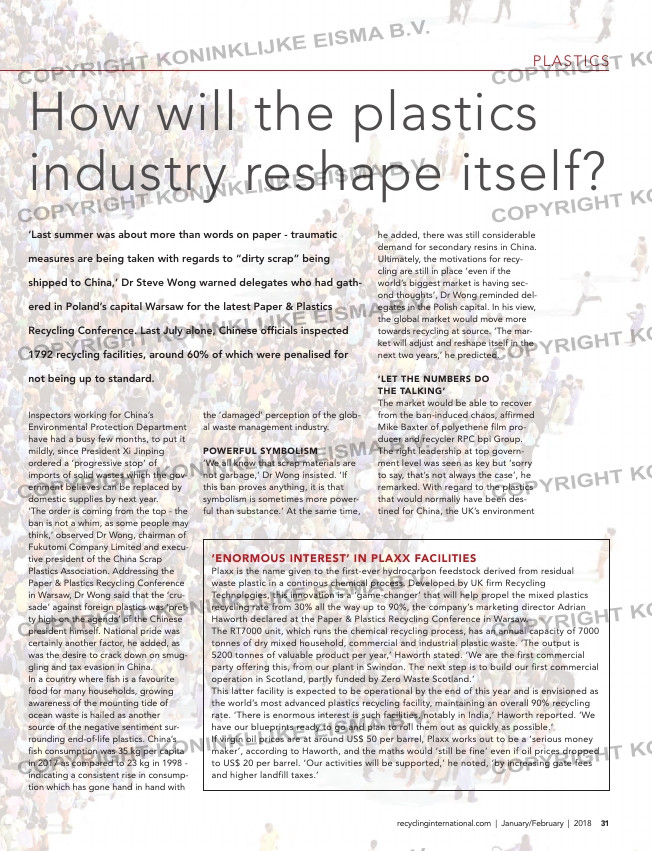Page 31 from: January / February 2018

plastics
How will the plastics
industry reshape itself?
‘Last summer was about more than words on paper – traumatic
measures are being taken with regards to “dirty scrap” being
shipped to China,’ Dr Steve Wong warned delegates who had gath-
ered in Poland’s capital Warsaw for the latest Paper & Plastics
Recycling Conference. Last July alone, Chinese officials inspected
1792 recycling facilities, around 60% of which were penalised for
not being up to standard.
Inspectors working for China’s
Environmental Protection Department
have had a busy few months, to put it
mildly, since President Xi Jinping
ordered a ‘progressive stop’ of
imports of solid wastes which the gov-
ernment believes can be replaced by
domestic supplies by next year.
‘The order is coming from the top – the
ban is not a whim, as some people may
think,’ observed Dr Wong, chairman of
Fukutomi Company Limited and execu-
tive president of the China Scrap
Plastics Association. Addressing the
Paper & Plastics Recycling Conference
in Warsaw, Dr Wong said that the ‘cru-
sade’ against foreign plastics was ‘pret-
ty high on the agenda’ of the Chinese
president himself. National pride was
certainly another factor, he added, as
was the desire to crack down on smug-
gling and tax evasion in China.
In a country where fish is a favourite
food for many households, growing
awareness of the mounting tide of
ocean waste is hailed as another
source of the negative sentiment sur-
rounding end-of-life plastics. China’s
fish consumption was 35 kg per capita
in 2017 as compared to 23 kg in 1998 –
indicating a consistent rise in consump-
tion which has gone hand in hand with
he added, there was still considerable
demand for secondary resins in China.
Ultimately, the motivations for recy-
cling are still in place ‘even if the
world’s biggest market is having sec-
ond thoughts’, Dr Wong reminded del-
egates in the Polish capital. In his view,
the global market would move more
towards recycling at source. ‘The mar-
ket will adjust and reshape itself in the
next two years,’ he predicted.
‘let the nuMbers do
the talKIng’
The market would be able to recover
from the ban-induced chaos, affirmed
Mike Baxter of polyethene film pro-
ducer and recycler RPC bpi Group.
The right leadership at top govern-
ment level was seen as key but ‘sorry
to say, that’s not always the case’, he
remarked. With regard to the plastics
that would normally have been des-
tined for China, the UK’s environment
‘enorMous Interest’ In PlaXX facIlItIes
Plaxx is the name given to the first-ever hydrocarbon feedstock derived from residual
waste plastic in a continous chemical process. Developed by UK firm Recycling
Technologies, this innovation is a ‘game-changer’ that will help propel the mixed plastics
recycling rate from 30% all the way up to 90%, the company’s marketing director Adrian
Haworth declared at the Paper & Plastics Recycling Conference in Warsaw.
The RT7000 unit, which runs the chemical recycling process, has an annual capacity of 7000
tonnes of dry mixed household, commercial and industrial plastic waste. ‘The output is
5200 tonnes of valuable product per year,’ Haworth stated. ‘We are the first commercial
party offering this, from our plant in Swindon. The next step is to build our first commercial
operation in Scotland, partly funded by Zero Waste Scotland.’
This latter facility is expected to be operational by the end of this year and is envisioned as
the world’s most advanced plastics recycling facility, maintaining an overall 90% recycling
rate. ‘There is enormous interest is such facilities, notably in India,’ Haworth reported. ‘We
have our blueprints ready to go and plan to roll them out as quickly as possible.’
If virgin oil prices are at around US$ 50 per barrel, Plaxx works out to be a ‘serious money
maker’, according to Haworth, and the maths would ‘still be fine’ even if oil prices dropped
to US$ 20 per barrel. ‘Our activities will be supported,’ he noted, ‘by increasing gate fees
and higher landfill taxes.’
31recyclinginternational.com | January/February | 2018
the ‘damaged’ perception of the glob-
al waste management industry.
PoWerful syMbolIsM
‘We all know that scrap materials are
not garbage,’ Dr Wong insisted. ‘If
this ban proves anything, it is that
symbolism is sometimes more power-
ful than substance.’ At the same time,
30-31-32-33_conferencereport-plastics.indd 31 25-01-18 15:46



